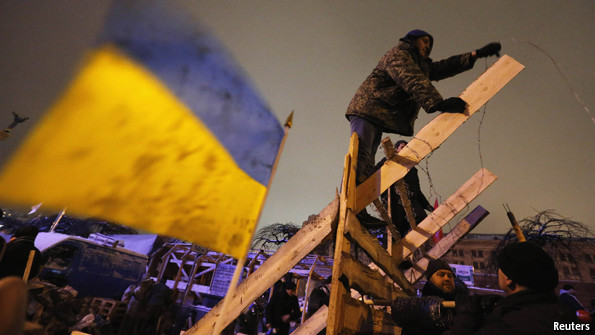Why does Ukraine have so many revolutions?
Dec 15th 2013, 23:50 by A.M.
TO the casual observer, it might seem as if Ukrainians are permanently in revolt. Huge street protests in 2004-5, known as the orange revolution, led to the overturning of a rigged election result and the installation of leaders who promised cleaner, better government. Now hundreds of thousands of people have again taken to the streets of Kiev and other cities, demanding, well, a new election and cleaner government (among other things). There were big protests in the years before the orange revolution, and have been regular street eruptions between it and the current bout. What is Ukraines problem?
For some outsiders (especially in Russia), the problem is Ukraine itself. It was a constituent republic of the Soviet Union (suffering terribly in famine, purges and war), coming into being as an independent nation only in 1991; before then it had existed as a country of sorts only for a brief spell after the Russian Revolution. The lands that now constitute Ukraine had previously been carved up between Russia, Poland, the Austro-Hungary empire, the Duchy of Lithuania and the Crimean Khanate. This splintered history, the theory goes, means that Ukraine is an artificial creation rather than a natural, coherent state. And indeed there are big cultural and political divisions among its people, in particular between the Ukrainian-speaking west and the mostly Russian-speaking south and east (also the countrys most heavily industrialised regions). Fierce rows occasionally erupt about the official status and usage of the two languages. Political allegiances seem to be contiguous with this division: at the presidential election of 2010, the south and east mostly voted for President Viktor Yanukovych, while the west (and Kiev, the capital), plumped for Yulia Tymoshenko, who was subsequently imprisoned on what many people see as bogus charges. Even today, despite his manifold failings, such as locking up his opponents and rampant cronyism, Mr Yanukovych retains considerable support in his industrial heartland.
The interventions of outside powers seem to reflect and reinforce this sense of a hopelessly divided identity. Vladimir Putin, Russias president, had tried to entice and bully Ukraine into joining a new Russian-led customs union, regarding the country as an integral part of Russias sphere of influence. The European Union, meanwhile, had hoped to sign a trade agreement with Ukraine last month. Mr Yanukovychs decision to reject the EU deal was the spark of the latest protest. Russias state-controlled media portrays the demonstrations as the result of Western scheming. That is dishonest: they have been indigenous and spontaneous, even if Western diplomats have been sympathetic to their aims.
So Ukraine is a complex, even fragile country. But for all that, the basic cause of its periodic revolutions is simpler: corruption and bad government. That Ukraine has been badly run in its two decades of independence is beyond dispute. The OSCE and other reputable observers have repeatedly been critical of the conduct of Ukrainian elections. European officials have lambasted the countrys judicial system. Transparency International, a watchdog, says corruption in Ukraine is bad and deteriorating, because of protectionism and the fusion of political and business interests. It ranks Ukraine 144th in cleanliness out of the 177 countries it surveys. The economy is in a parlous condition, and urgently in need of loans from the International Monetary Fund or others. The Rada, Ukraines parliament, is a zoo of catcalling and fisticuffs. The current uprising seems inspired by affection for the EU, but only because, to the protesters, it represents the goal of sounder government.
These problemscorruption, oligarch-dominated politics and business, dodgy electionssuggest a family resemblance between Ukraine and other post-Soviet states. In several of them (Azerbaijan, Kazakhstan and Uzbekistan spring to mind) corrupt elites took control of the machinery of state in the 1990s and have proven difficult to dislodge. Thus, in a way, Ukraines revolutions should probably be seen as a bid to shake off the mindset and legacy of the Soviet empire: a final battle that has yet to be won.

 I'm struggling to see any similarities of world-view of guys who made this video with world-view of Nazis.
I'm struggling to see any similarities of world-view of guys who made this video with world-view of Nazis.
 are blinded by authorities
are blinded by authorities  Sorry Olek but that is how I see it - feel free to disagree
Sorry Olek but that is how I see it - feel free to disagree 
